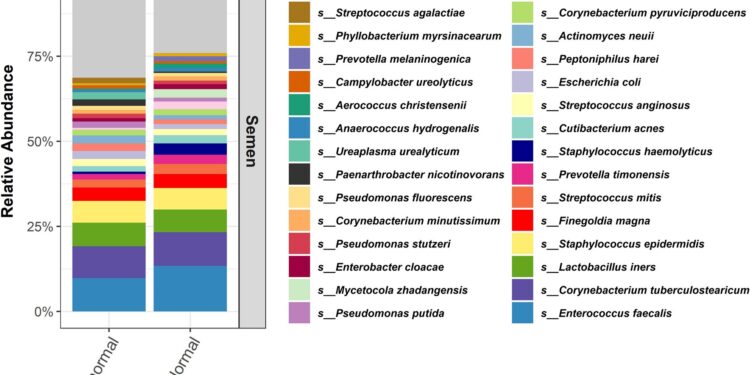Relative abundance, group 1. Relative abundance of the top 30 species of participants with normal sperm concentration and motility on SA compared to participants with at least one abnormality in sperm concentration or motility on SA. Credit: Scientific reports (2024). DOI: 10.1038/s41598-024-51686-4
You may have heard about the gut microbiome and its influence on a person’s overall health and well-being. It turns out the same may be true for the sperm microbiome.
According to researchers at the UCLA Department of Urology, the sperm microbiota may play a crucial role in influencing sperm parameters and improving male fertility.
Given recent studies highlighting the importance of the microbiome to overall human health, researchers have studied the sperm microbiome to understand its potential impact on male infertility. Exploring the functions of these microorganisms in sperm could potentially pave the way for the development of treatments to address any issues related to sperm parameters.
Published in Scientific reports, the study revealed that one microbe in particular, Lactobacillus iners, could have a direct negative impact on male fertility. Researchers found that men with more of this microbe were more likely to have problems with sperm motility.
Previous research has revealed that Lactobacillus iners can preferentially produce L-lactic acid, potentially leading to a pro-inflammatory environment locally, which could impair sperm motility. The study authors point out that existing research has hinted at the link between this microbe and fertility, but most of the literature focuses on the vaginal microbiome and female factors.
This is the first study to report a negative association between the microbe and male fertility.
The researchers also found that three types of bacteria from the Pseudomonas group were present in patients with normal and abnormal sperm concentrations. Microbes called Pseudomonas fluorescens and Pseudomonas stutzeri were more common in patients with abnormal sperm concentrations, while Pseudomonas putida was less common in samples with abnormal sperm concentrations.
However, the results indicate that not all members of the same closely related group may affect fertility in the same way, either positively or negatively. In other words, even closely related microbes don’t always have the same direct correlation with fertility.
“There is much more to explore regarding the microbiome and its link to male infertility,” said Vadim Osadchiy, a resident in the UCLA Department of Urology and lead author of the study. “However, these results provide valuable information that can lead us in the right direction for a deeper understanding of this correlation. Our research aligns with evidence from smaller studies and will pave the way for future, more comprehensive investigations to unravel the complex relationship between the sperm microbiome and fertility.
More information:
Vadim Osadchiy et al, The seminal microbiota is significantly altered in men with abnormal sperm parameters, Scientific reports (2024). DOI: 10.1038/s41598-024-51686-4
Provided by University of California, Los Angeles
Quote: Sperm microbiome health may impact male fertility (January 18, 2024) retrieved January 19, 2024 from
This document is subject to copyright. Apart from fair use for private study or research purposes, no part may be reproduced without written permission. The content is provided for information only.



